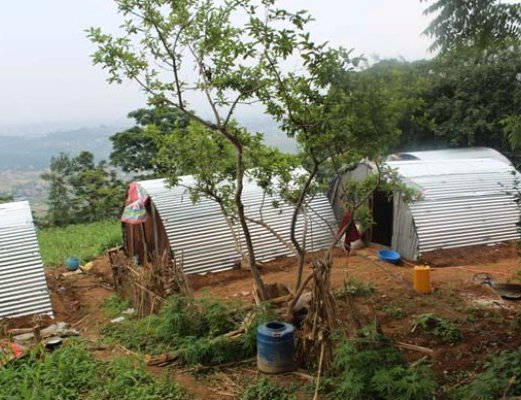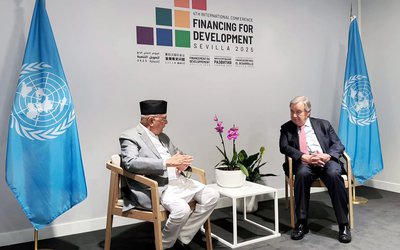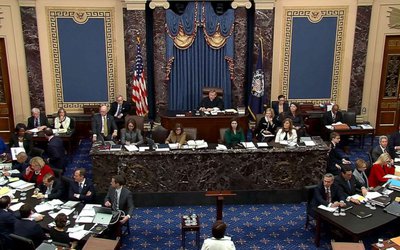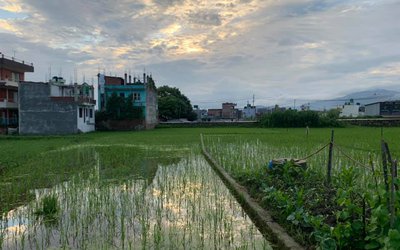
Following the great earthquake of April 25, Karuna Foundation Nepal (KFN) has built a number of temporary shelters.
Chiran Magar, a 29-year-old motorcycle mechanic living in Chalnakhel village on the southern outskirts of the Kathmandu Valley, lost his home when the 25 April earthquake struck central Nepal. The two-storey house, built by Chiran's father nearly 15 years ago, crumbled like a sandcastle.
Chiran spent two weeks in a tent with his wife and children, braving rains that lashed at central Nepal much before monsoon's arrival this year. His little children were beginning to fall sick but he was helpless. His house was irreparably damaged, and he did not have money to build a new one.
But Chiran's problem was solved when Karuna Foundation Nepal (KFN) built a safer shelter for his family. Two weeks after the earthquake, he moved to a tunnel home built by KFN.
“Life was hard under the tent,” he says. “It used to be difficult when it rained, my little children would fall sick. But we’re less worried about the rain now. It's much better and safer here."
Chiran's is not the only family which received KFN's support to build safer and stronger shelters. KFN built tunnel houses for 10 families in Chalnakhel where more than 80 per cent houses had collapsed. Not only did KFN provide galvanized sheets, iron rods and iron wires but also the necessary skills for the locals to build arc-shaped tunnel houses.
The earthquake-affected people of Chalnakhel are living happily in the KFN-built tunnel houses. They say they feel safe here, and can plan for reconstruction of their damaged houses.
"We will be living here through monsoon season, probably until Dashain festival," says Chiran. "We will have managed resources to build new houses by winter."
The Nepalis are masters of improvisation. Even in Chalnakhel, the earthquake-affected locals have improvised their tunnel houses by adding wooden doors and windows. They have laid bricks on the floor and applied clay mixed with dung all over it. And these tunnel shelters are now much safer, stronger and more livable. The earthquake-affected people living in these tunnel houses feel a sense deep gratitude for KFN's support.
"Without KFN's support, I can't imagine how difficult our lives would have been," says Chiran. "The support was timely and just what we needed."
Chet Kumar Khatri, an engineer who specialized in earthquake-resistant construction, also volunteered for KFN to build these tunnel houses. He says construction of tunnel houses for earthquake victims was a great idea because these houses were cost-effective and easy-to-build.
"If we have all the materials ready, we can build a tunnel house in less than one hour," he says. "Improvisation might take a little more time, though."
KFN was inspired by Pakistan's success story to build tunnel houses. In Pakistan, the locals had built similar arch-shaped shelters after the devastating earthquake in 2013. It was KFN's Executive Director Deepak Raj Sapkota who came up with the idea of building safer shelters for the earthquake-affected families. When he reached the quake-ravaged villages and saw people without shelters and worried about the fast-approaching monsoon, Sapkota consulted senior government authorities, weighed several options and finally zeroed in on these tunnel houses.
Karuna Foundation Nepal built a total of 238 temporary shelters comprising both tunnel shaped houses and of local design in Chalnakhel of Dakchhinkali Municipality ward no.1.
Protecting rape survivor
After Nepal's earthquake, several international organizations have been trying to draw the government's attention to vulnerability of the children forced to live in tents. They say that the children – homeless, orphans or separated from parents are under the risk of being physically and sexually abused, raped and trafficked. However, no organization has produced any evidence so far.
The KFN, nevertheless, has not only come across one of such cases but also helped the raped girl by providing her family with shelter and foods.
A teen-age girl in Kavre district was raped when she was sleeping out in the open after the earthquake. Her family was poor, could not build a safer shelter and just erected a tent with some plastic sheets when the earthquake destroyed their house. The girl was homeless but not orphaned. But when all her family members were away in search of relief materials, she was raped by a neighborhood man. The rapist also threatened to kill her if she told anyone anything about it. But the girl dared to tell her family about her suffering.
Immediately after learning about the case, the KFN contacted Kavre's Child Rights Officer and approached the girl's family. They were still living in the same tent, which was not safe from rains, sexual offenders and criminals. The KFN built a dome-shaped tunnel house for her family. The girl who was scared after the incident now feels very much safe in the KFN-built shelter. The KFN has also decided to provide more help to the girl in the days to come.
On the other hand, the rapist is still at large. A complaint has been filed against him and the police have already launched a manhunt to nab him.
- MELAMCHI WATER SUPPLY: No Interruption During Monsoon
- Jun 25, 2025
- KOREAN RETURNEES: Successful Integration
- Jun 25, 2025
- UPPER TRISHULI-1: Engaging With Local
- Jun 25, 2025
- IME GROUP: Twenty Five Years Of Journey
- Jun 24, 2025
- NEPAL’S AIR POLLUTION: A Growing Health Concern
- Jun 24, 2025















